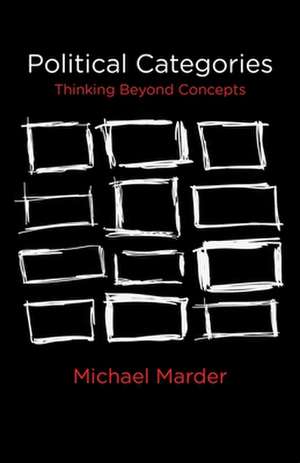Political Categories – Thinking Beyond Concepts
Autor Michael Marderen Limba Engleză Paperback – 14 mar 2019
| Toate formatele și edițiile | Preț | Express |
|---|---|---|
| Paperback (1) | 251.53 lei 6-8 săpt. | |
| Columbia University Press – 14 mar 2019 | 251.53 lei 6-8 săpt. | |
| Hardback (1) | 614.70 lei 6-8 săpt. | |
| Columbia University Press – 14 mar 2019 | 614.70 lei 6-8 săpt. |
Preț: 251.53 lei
Nou
Puncte Express: 377
Preț estimativ în valută:
48.13€ • 50.39$ • 39.82£
48.13€ • 50.39$ • 39.82£
Carte tipărită la comandă
Livrare economică 05-19 aprilie
Preluare comenzi: 021 569.72.76
Specificații
ISBN-13: 9780231188692
ISBN-10: 0231188692
Pagini: 256
Dimensiuni: 142 x 217 x 16 mm
Greutate: 0.36 kg
Editura: Columbia University Press
ISBN-10: 0231188692
Pagini: 256
Dimensiuni: 142 x 217 x 16 mm
Greutate: 0.36 kg
Editura: Columbia University Press
Notă biografică
Michael Marder
Cuprins
Preface
1. Political Categories
2. The Initial Approach: Aristotle
3. The Second Look: Kant
4. The Categories ¿At Work¿
Appendix 1. Aristotle¿s Categories¿a Political Interpretation
Appendix 2. Kant¿s ¿Transcendental Analytic¿ (Critique of Pure Reason)¿a Political Interpretation
Notes
Bibliography
Index
1. Political Categories
2. The Initial Approach: Aristotle
3. The Second Look: Kant
4. The Categories ¿At Work¿
Appendix 1. Aristotle¿s Categories¿a Political Interpretation
Appendix 2. Kant¿s ¿Transcendental Analytic¿ (Critique of Pure Reason)¿a Political Interpretation
Notes
Bibliography
Index
Descriere
Descriere de la o altă ediție sau format:
Michael Marder proposes a new methodology for political science and philosophy, one which he terms “categorial thinking.” Under this lens, the political appears not as a singular concept but as a family of categories, allowing room for new, plural, and often antagonistic ideas about the state, the people, sovereignty, and power.
Michael Marder proposes a new methodology for political science and philosophy, one which he terms “categorial thinking.” Under this lens, the political appears not as a singular concept but as a family of categories, allowing room for new, plural, and often antagonistic ideas about the state, the people, sovereignty, and power.
